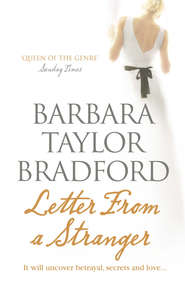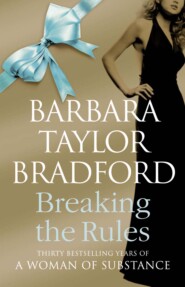По всем вопросам обращайтесь на: info@litportal.ru
(©) 2003-2024.
✖
Just Rewards
Автор
Год написания книги
2018
Настройки чтения
Размер шрифта
Высота строк
Поля
How well she knew him, and in ways no one else ever had before.
His new tactic was to tell her everything up front, without preamble, and so he said, ‘It’s Mrs Caldwell. She had a heart attack late yesterday afternoon, and the woman who helps her brought Atlanta over here this morning.’
‘Oh, how dreadful!’ India exclaimed. ‘I mean about the heart attack. How is Mrs Caldwell today?’
‘Apparently it’s serious but not life-threatening. She’ll be in hospital for about a week, and from what Mrs Roebotham says, the prognosis is good. I’ll call the doctor later; in the meantime Atlanta’s here to say with me for a few days. Until her grandmother’s better, actually.’
India smiled at him. ‘Don’t look so concerned, Dusty, she’ll be fine with us, and I couldn’t be happier. It’s lovely to have her here for the weekend. We’ll have some fun together. Where is she now?’
‘Having lunch with Mrs Roebotham in the kitchen, but she’s really looking forward to seeing you later.’
‘So am I. And Grandma, you’ll get to meet Dusty’s little girl. She’s just adorable.’
Edwina simply nodded and took a sip of sherry. No doubt Atlanta was adorable, and certainly India was genuine in her affection for the child, but Edwina couldn’t help thinking that it was a good thing she was still only three years old. And still malleable. There was no doubt in Edwina’s mind that Dusty and India would end up raising his child. His former girlfriend was recovering from a serious drug-addiction and her mother obviously had a wonky heart. She might not live long; and who could answer for the daughter … addictions were hard to kick …
CHAPTER EIGHT (#ulink_3e665e60-d7b1-598d-af59-4c2dfa57f2f6)
Tessa Fairley stood in her room at Pennistone Royal, lost in thought. Of late, there were moments when she couldn’t help wondering what the rest of her life was going to be like. What did the future hold in store for her? What was her destiny to be?
The one certainty, the one steadfast thing in her life, was her devotion and love for her three-year-old daughter Adele. Everything else was vague, up in the air, or out of her grasp, at least so it seemed to her lately.
Would she be made managing director of the Harte stores by her mother? Would she then run them herself, as she had always wanted to do? Or would her mother decide to make her joint managing director with her sister Linnet? Shared responsibilities had been bruited about in the past few months, startling her, disappointing her, putting her on guard. That was something she had never wanted … sharing the top spot with her sister.
Conversely, would she abandon her career, ambitions, and dreams of being the new Emma Harte, and instead marry Jean-Claude Deléon?
She smiled inwardly. There was just one small problem in that regard: he had not asked her to marry him. But if he did propose, and if she accepted, there would be a vast upheaval in her life and that of her child.
Since he lived and worked in Paris, she would have to move across the Channel and make a life with him there. Could she be happy in France?
Tessa almost laughed out loud. Of course she could. She was a dyed-in-the-wool Francophile, and she loved Paris, knew the City of Light as well as she knew London. Well, almost. Years before meeting Jean-Claude, she had been going to Paris on a regular basis, and Shane O’Neill, her stepfather, owned one of the most exclusive and deluxe hotels in the city, on the elegant Avenue Montaigne, off the Champs Élysées.
Then there was Jean-Claude’s small country estate where he spent most weekends. Located outside Paris, near Fontainebleau, it was a picturesque country manor called Clos-Fleuri. On her first visit last summer she had taken an instant liking to it, and she felt at home there, as if she truly belonged. Apart from the beautiful grounds and gardens, the house was lovely, full of charm, and when she was there she felt enveloped in quiet luxury and comfort. There was a peacefulness about it that she cherished.
All of these points aside, Tessa was deeply in love with Jean-Claude, and she had realized from the beginning of their affair that she could be happy with him anywhere.
Tessa had never known anyone like him. He was loving, warm, and kind to her, and he adored little Adele. Emotional considerations apart, he was a man she respected and admired. He had a vivid intelligence, was clever, street-smart, and absolutely brilliant in his work. Yet despite his superior intellect, he never made her feel inferior. They got on well and were great companions; she had never felt that way with her former husband, Mark Longden. He had always managed to put her down and beat her up – verbally and physically.
Jean-Claude Deléon, one of the most famous men in France, if not indeed in the world, had fallen in love with her the minute he had met her. And she with him. He called it a coup de foudre. ‘We were struck by lightning,’ he sometimes said, smiling at her tenderly.
That had been last August. In the last five months they had managed to spend a great deal of time together in Paris and London, at Clos-Fleuri, and here in Yorkshire at her mother’s home. And during these months they had grown closer, come to know each other most intimately on every level. It was so right, this affair of theirs, and they both knew it.
But there was a problem, and it troubled her. What would she do if she married him? She had always worked. Hard graft was bred in the bone of every Harte, and she was no exception. She had been brought up to be disciplined, dedicated, driven, and an achiever. Just as the whole family had. So wouldn’t she be bored if she didn’t have a job?
Naturally she would be bored. Bored silly. And especially since Jean-Claude worked like a Trojan himself, writing books, screenplays, plays for the theatre, and articles for newspapers and magazines. He filmed documentaries and gave lectures. He was forever occupied.
And then there was his great fame in France. He was the philosopher-king, the favourite of presidents and politicians, and a member of the Parisian elite.
Fame had its own demands. She was well aware of that; her brother Lorne, her beloved twin, was a famous actor. Fame ate up his time, just as it ate Jean-Claude’s time. There were personal appearances, press and publicity, events to attend, and she knew it was all part of his work.
Tessa let out a heavy sigh and sat down in the chair at her desk. There were so many questions bouncing around in her head this morning, and no answers were forthcoming.
She glanced at the mail on her desk, which she had brought with her from London. After reading the letters and emails, she put them back in their folder and pushed it to the end of the desk, an old French bureau plat she treasured. Then her eyes scanned the little sitting room which adjoined her bedroom. This intimate suite of rooms had been hers for as long as she could remember, and she loved its primrose-yellow walls and yellow-and-red toile de Jouy documentary print at the windows. In this room were displayed all her favourite possessions, decorative objects, beloved books and paintings, which she had collected over the years. They helped to give the two rooms their attractive aspects and personality, bespoke her taste as well as personal preferences. It was distinctively her décor and no one else’s.
Glancing at her watch Tessa suddenly realized she ought to go downstairs and find Jean-Claude and the others, offer them drinks before lunch. Her mother, who had gone to West Tanfield with Aunt Emily, had asked her to look after everyone, be the hostess in her absence.
Earlier, when she had talked to Margaret, the housekeeper had insisted on making lunch, because, as she put it, ‘You’ll have your hands full doing dinner tonight, Miss Tessa.’ And so she had let the housekeeper take over. A short while ago, Margaret had come up to tell her about the menu. She was making hot leek-and-potato soup, a chicken pot pie, a cottage pie, and fish cakes for those who wanted lighter fare. There was green salad and cheese, as well as fresh fruit.
Margaret had then thought to add, ‘And what about all this lamb stew, Miss Tessa? You’ve ordered far too much meat. Why, there’s enough to feed an army, that there is!’
Tessa had quickly answered that there were a lot of bones in lamb shoulder and neck, and that everyone liked a stew the next day anyway, because it tasted even better.
Tutting to herself, Margaret had said no more, but she had looked annoyed as she stomped off to the kitchen. Perhaps she’s cross with me because I’ve invaded her territory again, Tessa thought, then shrugged. She enjoyed cooking, and if she was in the kitchen Margaret could have a night off. But the housekeeper wouldn’t see it that way.
Rising, Tessa now walked through into her bedroom, and took a sage-green wool jacket out of the wardrobe. Slipping it on, she swung around and stood for a moment regarding the bed.
No one had ever shared this bed with her in all of her life. None of her siblings when they were growing up, and certainly not Mark Longden. Whenever she and Mark had stayed at Pennistone Royal after their marriage, she had asked her mother to put them in the Blue-and-White Suite. On these occasions she had been able to use her own rooms as her private place, somewhere to be alone, to rest and work. It was her quiet haven during her marriage, as it had been from childhood. Her little yellow-and-red suite was sacrosanct. No one was ever permitted to share it with her, and never had been.
Until last night. When the house was still and everyone had gone to sleep, Jean-Claude had come to her bedroom at her invitation. He had slipped into the bed with her, taken her in his arms, and held her close. They had loved each other very tenderly … and it had pleased her that he was with her here. He was her one true love, her soul mate, the only man she wanted, and wherever she was she wanted him with her. So her private haven was willingly opened to him, and with joy.
She never worried about the difference in their ages, but she was aware he did. He was over twenty years older, and it bothered him. Sometimes she chided him for that, told him not to be silly, and he would nod, and smile, and change the subject. She wanted to have another child, but only by him; she wanted it even if they weren’t married. But whenever she thought of bringing it up she lost her nerve. Perhaps this weekend she would mention it …
The buzzing phone interrupted her thoughts. ‘Hello?’
‘C’est moi, chérie,’ Jean-Claude said.
‘How odd!’ Tessa exclaimed. ‘I was just thinking about you.’
He chuckled. ‘Nice things, I hope.’
‘Oh yes, very, very, very nice things.’
‘Are you coming downstairs, my Tess? I would like to talk to you about … something.’
‘I was just on my way out, coming down to find you.’
‘I shall await you in the library.’
‘See you in a jiffy.’
She hung up the phone, glanced at herself in the mirror, liking the sage-green wool jacket with the cream sweater and matching cream-wool trousers. Invariably, Tessa wore light colours, knowing how well they suited her pale blonde colouring, and she had discovered Jean-Claude preferred them to darker shades.
Hurrying across the bedroom, she went out into the corridor and down the wide curving staircase, heading for the library, wondering what he wanted to talk to her about.
The great Stone Hall was empty, but a fire blazed up the chimney and it was a warm and welcoming sight, as were the many large pots of gold, yellow and bronze chrysanthemums and the white orchids. Her mother always had a lovely display of plants in the Stone Hall, following the tradition started by Emma many years before. Gardening was Paula’s hobby and many of the plants in the house were grown by her in the greenhouses.
Tessa’s high-heeled cream boots made a staccato sound as she crossed the Stone Hall, and went into the library.
Jean-Claude swung around as she entered and he hurried over to her, kissed her cheek.











